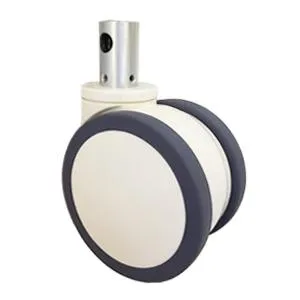2025 Guide to Central Locking Casters: Models, Applications, and Maintenance
Central locking casters, also known as central locking castors, are essential for medical, industrial, and commercial equipment, providing enhanced safety, stability, and convenience. From hospital beds and medical carts to heavy-duty industrial trolleys, selecting the right central locking casters ensures optimal performance and efficiency. In this comprehensive guide, we cover brands, models, key features, applications, selection tips, maintenance, and FAQs.
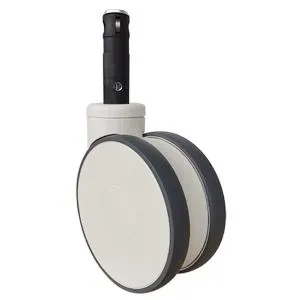
What Are Central Locking Casters?
Central locking casters are a type of caster system that allows for the simultaneous locking and unlocking of multiple casters, typically using a single lever or pedal. This system provides secure and stable positioning for equipment, preventing unwanted movement or rotation. Central locking casters are commonly used in medical equipment like hospital beds, as well as in industrial settings for heavy machinery and equipment.
Key Features
- Centralized Locking Mechanism:
A single action locks or unlocks all wheels at once, simplifying the process and enhancing safety, especially in situations involving multiple casters. - Strong Load Capacity:
Designed to handle heavy equipment and loads, ensuring stability and reliability. - Smooth and Silent Operation:
Many central locking casters feature non-marking wheels that ensure quiet and smooth movement on various floor surfaces. - Precise Position Control:
In medical applications, they enable healthcare professionals to easily adjust bed positions for patient comfort and care. - Improved Safety:
The locking mechanism prevents unintended movement, reducing the risk of accidents, especially important in healthcare settings. - Increased Efficiency:
Central locking casters can be operated by foot or hand, allowing for efficient and effortless movement and securing of equipment. - Modular Design:
Some systems offer modular designs, allowing for flexible configurations and easy retrofitting. - Dual Locking:
Some casters offer the ability to lock both the swivel and the wheel rotation simultaneously, providing enhanced stability. - Applicable to various industries:
Central locking casters are used in medical, industrial, and commercial settings where equipment needs to be easily moved and secured. - In summary, central locking casters are a valuable tool for enhancing safety, efficiency, and stability in applications where multiple casters need to be locked or unlocked simultaneously.
Benefits of Central Locking Casters
Implementing central locking casters offers numerous advantages:
- Enhanced Safety: Prevents equipment movement, protecting patients, staff, and operators.
- Time-Saving: Single-step locking saves time compared to individual wheel locks.
- Versatile Application: Works with hospital beds, cribs, medical carts, industrial trolleys, and furniture.
- Durable and Reliable: High-quality materials resist wear and provide long-term performance.
- Improved Workflow: Simplifies movement and positioning in busy environments.
Types of Central Locking Casters
There are several types of central locking casters designed for different applications:
Medical Central Locking Casters
Used in hospitals and clinics for beds, cribs, dialysis chairs, surgical tables, and medical carts. They feature smooth rolling, non-marking wheels, and synchronized locking mechanisms. Examples include:
- Single-wheel central locking for hospital beds, easy foot pedal operation, polyurethane tread.
- Robust swivel casters with central locking, suitable for high-traffic areas.
- Central lock system for baby cribs with anti-tipping safety features.
Industrial Central Locking Casters
Designed for heavy-duty use in warehouses, factories, and workshops:
- Foot pedal lock, heavy-duty polyurethane tread, 300–600 kg load capacity.
- Industrial-grade central locking for trolleys and equipment carts, synchronized brake system.
- Optional central locking upgrade, various wheel materials and sizes.
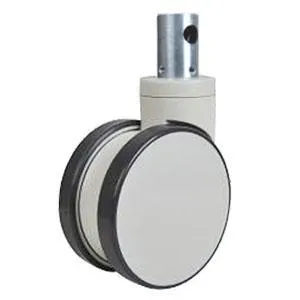
Twin Wheel Central Locking Casters
Provide extra stability and load distribution, suitable for uneven surfaces or heavier equipment:
- Synchronized central lock, polyurethane tread, easy foot pedal activation.
Automatic/Self-Locking Casters
Lock automatically when equipment stops, reducing human error and improving workplace safety:
- Auto-locking for medical and industrial carts, foot pedal or motion-activated lock.
Applications of Central Locking Casters
Medical Applications
- Hospital beds, cribs, dialysis chairs, medical carts, surgical tables.
- Improve patient safety by preventing unintentional movement.
- Foot pedal or hand lever locking for quick operation by staff.
Industrial Applications
- Heavy-duty trolleys, machinery, warehouse equipment.
- Synchronized locking ensures stability during loading, maintenance, or positioning.
Commercial Applications
- Furniture, office chairs, equipment carts, storage units.
- Combines mobility with safety when stationary.
How to Select the Right Central Locking Casters
- Load Capacity: Ensure casters exceed maximum weight including equipment and contents.
- Wheel Material: Polyurethane (quiet, smooth), Rubber (shock absorption), Nylon/Steel (heavy-duty).
- Locking Mechanism: Foot pedal, hand lever, automatic motion-activated lock.
- Wheel Size: Larger wheels handle uneven floors; smaller wheels fit compact spaces.
- Environment: Non-marking, corrosion-resistant wheels for medical settings; heavy-duty for industrial floors.
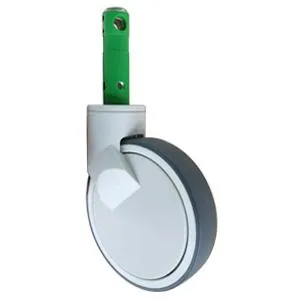
Maintenance Tips for Central Locking Casters
- Regularly inspect for damage, wear, or loose parts.
- Clean wheels from hair, dust, and debris; sanitize for medical use.
- Lubricate swivel bearings to maintain smooth movement.
- Check and tighten mounting bolts and fasteners.
- Replace worn or damaged casters immediately to maintain safety.
Top Brands and Products
- STEINCO: Central locking caster systems for medical and industrial use.
- Medcaster: Primacy and Rhombus 390 series for hospital beds, medical carts, and cribs.
- Caster Connection: Locking casters with brakes for industrial and medical applications.
- SL Caster: Twin wheel central locking casters for stability on uneven floors.
- Blickle: Special brake systems, directional lock casters, industrial applications.
- Linea: Automatic central locking casters for motion-activated safety.
- Jarvis Caster: PDF product guides for central lock casters with detailed specs.
- Richmond AU: Medical central locking series for hospital beds and equipment carts.
Frequently Asked Questions (FAQs)
Q1: What is the difference between central locking casters and individual locking casters?
Central locking casters lock all wheels simultaneously, improving efficiency and safety. Individual locking casters require each wheel to be locked separately.
Q2: Can central locking casters be used on all hospital beds?
Most central locking casters are compatible,
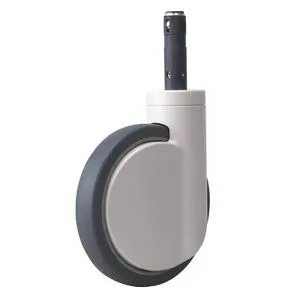
Henyuan Medical Caster delivers a complete range of high-quality caster wheels for hospital beds, ensuring smooth mobility, patient safety, and reliable performance. Explore our solutions for hospital bed wheels for sale or replacement wheels for hospital beds, and invest in the safety and efficiency of your healthcare facility.
For hospital bed caster, hospital bed caster wheels, wheels for hospital bed, or wholesale hospital bed on wheels, Henyuan Medical Caster ensures reliability, safety, and efficiency for every healthcare facility.
If you want more medical spare parts,you can visit our other website: medicalfurnitures.com
Bangkok in Thailand
Chiang Mai in Thailand
Pattaya in Thailand
Ayutthaya in Thailand
Phuket in Thailand
Hat Yai in Thailand
Khon Kaen in Thailand
Udon Thani in Thailand
Nakhon Ratchasima in Thailand
Chon Buri in Thailand
Si Racha in Thailand
Phitsanulok in Thailand
Lampang in Thailand
Surat Thani in Thailand
Ubon Ratchathani in Thailand
Nakhon Si Thammarat in Thailand
Rayong in Thailand
Nakhon Pathom in Thailand
Nonthaburi in Thailand
Pak Kret in Thailand
Si Sa Ket in Thailand
Trang in Thailand
Prachuap Khiri Khan in Thailand
Chachoengsao in Thailand
Chanthaburi in Thailand
Loei in Thailand
Nakhon Nayok in Thailand
Nakhon Phanom in Thailand
Mukdahan in Thailand
Maha Sarakham in Thailand
Sakon Nakhon in Thailand
Sukhothai in Thailand
Phichit in Thailand
Kamphaeng Phet in Thailand
Phayao in Thailand
Nan in Thailand
Phrae in Thailand
Uttaradit in Thailand
Phatthalung in Thailand
Satun in Thailand
Ranong in Thailand
Krabi in Thailand
Phang Nga in Thailand
Kanchanaburi in Thailand
Ratchaburi in Thailand
Phetchaburi in Thailand
Chumphon in Thailand
Narathiwat in Thailand
Pattani in Thailand
Songkhla in Thailand
Yala in Thailand

